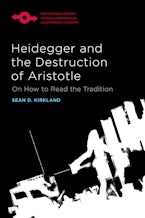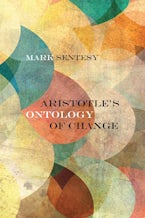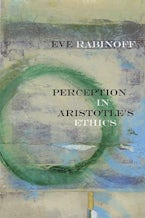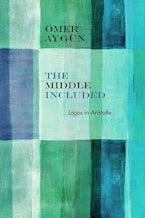PHILOSOPHY / History & Surveys / Ancient & Classical
Showing results 1-10 of 16
Filter Results OPEN +

Heidegger and the Destruction of Aristotle
Studies in Phenomenology and Existential Philosophy
A bold new conception of Heidegger’s model of Destrucktion as a method of interpreting history that enables us to reorient and indeed transform its own most troubling legacies.
Plato and Aristophanes
Plato and Aristophanes claims that our search for communal justice must start with self-examination. Marina Marren strikes up a conversation between three of Aristophanes’s comedies—Assembly Women, Knights, and Birds—and Plato’s Republic, prompting questions about one’s convictions and actions.
Aristotle's Ontology of Change
This book examines what change is and what it contributes to ontology in the work of Aristotle.
A Companion to Ancient Philosophy
The essays collected in this volume provide an introduction to Ancient Greek and Roman philosophy, from the Pre-Socratics (6th and 5th century BCE) through Plato (429–347 BCE) and Aristotle (384–322 BCE) up to and including the Hellenistic period (322 BCE. to the third century CE).
Philosophy as Agôn
Robert Metcalf's Philosophy as “Agôn” demonstrates that the dynamic contest between interlocutors in the dialogues is essential to Plato’s philosophical purpose.
The Philosophy of Epicurus
The teachings of Epicurus, whose philosophy focused on the pursuit of happiness, attracted adherents throughout the ancient Mediterranean world and deeply influenced later European thought. The...
Perception in Aristotle’s Ethics
By establishing and accounting for perception’s place in ethics, Perception in Aristotle's Ethics shows the importance for ethical life of integrating both elements of human nature, the rational and non-rational, the human and the animal.
The Emerging Good in Plato's Philebus
In "The Emerging Good in Plato’s “Philebus," John V. Garner argues that the Socratic pleasures of learning transcend states of being and explicitly embrace the value of change and becoming.
The Middle Included
The Middle Included is Ömer Aygün's systematic exploration of the meanings of logos throughout Aristotle’s work.
A Study of Dialectic in Plato's Parmenides
In this book, Eric Sanday boldly demonstrates that Plato’s “theory of forms” is true, easy to understand, and relatively intuitive. Sanday argues that our chief obstacle to understanding the theory of forms is the distorting effect of the tacit metaphysical privileging of individual things in our everyday understanding. For Plato, this privileging of things that we can own, produce, exchange, and through which we gain mastery of our surroundings is a significant obstacle to philosophical education.

Heidegger and the Destruction of Aristotle
Studies in Phenomenology and Existential Philosophy
A bold new conception of Heidegger’s model of Destrucktion as a method of interpreting history that enables us to reorient and indeed transform its own most troubling legacies.
Plato and Aristophanes
Plato and Aristophanes claims that our search for communal justice must start with self-examination. Marina Marren strikes up a conversation between three of Aristophanes’s comedies—Assembly Women, Knights, and Birds—and Plato’s Republic, prompting questions about one’s convictions and actions.
Aristotle's Ontology of Change
This book examines what change is and what it contributes to ontology in the work of Aristotle.
A Companion to Ancient Philosophy
The essays collected in this volume provide an introduction to Ancient Greek and Roman philosophy, from the Pre-Socratics (6th and 5th century BCE) through Plato (429–347 BCE) and Aristotle (384–322 BCE) up to and including the Hellenistic period (322 BCE. to the third century CE).
Philosophy as Agôn
Robert Metcalf's Philosophy as “Agôn” demonstrates that the dynamic contest between interlocutors in the dialogues is essential to Plato’s philosophical purpose.
The Philosophy of Epicurus
The teachings of Epicurus, whose philosophy focused on the pursuit of happiness, attracted adherents throughout the ancient Mediterranean world and deeply influenced later European thought. The...
Perception in Aristotle’s Ethics
By establishing and accounting for perception’s place in ethics, Perception in Aristotle's Ethics shows the importance for ethical life of integrating both elements of human nature, the rational and non-rational, the human and the animal.
The Emerging Good in Plato's Philebus
In "The Emerging Good in Plato’s “Philebus," John V. Garner argues that the Socratic pleasures of learning transcend states of being and explicitly embrace the value of change and becoming.
The Middle Included
The Middle Included is Ömer Aygün's systematic exploration of the meanings of logos throughout Aristotle’s work.
A Study of Dialectic in Plato's Parmenides
In this book, Eric Sanday boldly demonstrates that Plato’s “theory of forms” is true, easy to understand, and relatively intuitive. Sanday argues that our chief obstacle to understanding the theory of forms is the distorting effect of the tacit metaphysical privileging of individual things in our everyday understanding. For Plato, this privileging of things that we can own, produce, exchange, and through which we gain mastery of our surroundings is a significant obstacle to philosophical education.










